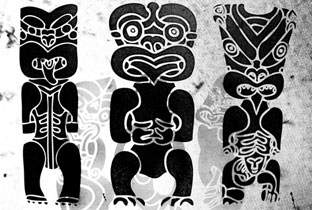Published
Fri, Nov 1, 2013, 12:01
- The Livity Sound co-founder has revealed how his label "unintentionally and unwittingly entered into a passionate and extremely complex debate" about Māori culture.

Livity Sound has found itself at the centre of a debate about cultural appropriation, after the Bristol label was criticised for using Maori symbols in its artwork.
This week the Nerdy Frames blog published an email from Auckland-based academic Tiopira McDowell, who specialises in Maori studies, saying the images used by the Bristol label were "sacred, untouchable, not for everyday use, and certainly not for appropriation by outsiders." McDowell added: "I realise you have probably not done this on purpose, and no malice is intended, but try and see it from a Maori perspective [...] When you steal images from us, this is not an isolated event, it is one more theft in a series of thefts that go back to when your countryman James Cook arrived on our shores."
Livity Sound member Peverelist, real name Tom Ford, responded with a statement on his Punch Drunk blog. He says he came across the images after a chance find by a designer friend in a Bristol library. "The book was about interpretations of Ancient World iconography and from it he drew on the outlines of eight 'icons' which, once filled out and with some reshaping, alteration and adjustment to fit the medium constraints, became the hand stamp images for the eight 12-inch labels," Ford says.
Ford adds that he started receiving messages about Livity Sound artwork shortly after the release of the recent self-titled album that compiled previously released vinyl singles alongside new tracks. "Soon after the release of the CD, I started to receive messages from curious New Zealanders via social media asking about the CD artwork, why we had used Maori art and what the connection was to our music," he says. "This suggestion came as a surprise to me as it was the first time anyone had explicitly connected the label design to indigenous Maori art."
Ford adds: "It became clear to me that we had unintentionally and unwittingly entered in to what is a passionate and extremely complex debate with diverging opinions within New Zealand regarding indigenous intellectual property and ownership, cultural sustainability and the misappropriation of Maori culture." Ford goes on to express his regret at the incident, and stated that future Livity Sound records would not carry Maori artwork. "This demonstrated to me that our CD cover could be considered as a misappropriation of traditional Maori design and that this misappropriation could be offensive to some."